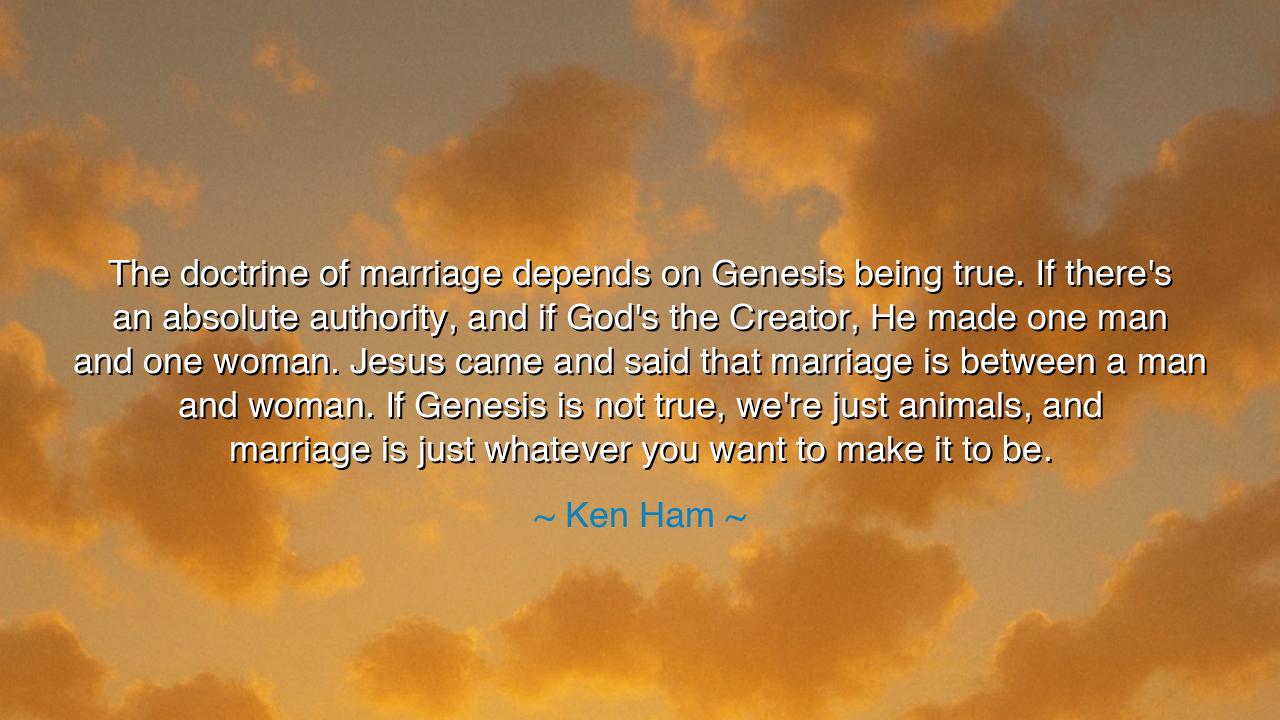
The doctrine of marriage depends on Genesis being true. If
The doctrine of marriage depends on Genesis being true. If there's an absolute authority, and if God's the Creator, He made one man and one woman. Jesus came and said that marriage is between a man and woman. If Genesis is not true, we're just animals, and marriage is just whatever you want to make it to be.






In the voice of Ken Ham, a man devoted to the ancient truths of Scripture, there resounds a declaration that pierces through the confusion of modern times: “The doctrine of marriage depends on Genesis being true. If there's an absolute authority, and if God's the Creator, He made one man and one woman. Jesus came and said that marriage is between a man and woman. If Genesis is not true, we're just animals, and marriage is just whatever you want to make it to be.” These words, bold and immovable, are not spoken as mere opinion—they are the cry of one who sees the crumbling foundations of faith and calls humanity to remember its source. In them lives a defense of order, divine design, and purpose, and a warning that when those are forgotten, the sacred dissolves into chaos.
At the heart of this quote lies a timeless conviction: that the laws of love and union are not the inventions of men but the ordinances of the Creator. To Ken Ham, the Book of Genesis is not myth but the cornerstone of meaning—the moment in which God shaped the universe with intention and breathed life into humankind as His image-bearers. When he says that “the doctrine of marriage depends on Genesis being true,” he means that all morality, all identity, all human dignity flows from the belief that we are created, not accidental. For if there is no Creator, there is no creation—only chance. And if all is chance, then love, loyalty, and marriage lose their sanctity, becoming mere arrangements of instinct and desire.
Such an idea echoes through the corridors of time. In the ancient world, when societies turned from the gods or lost faith in divine law, they often fell into moral confusion. The philosopher Plato, though not a prophet, once warned that when truth becomes relative, society becomes unmoored, drifting without compass or star. Ken Ham’s words revive this same wisdom: that the truth of Genesis is not just theology—it is the root of human order. For when man forgets who made him, he forgets what he was made for.
Consider the story of William Wilberforce, who fought to abolish slavery in 18th-century England. His conviction was not born of reason alone, but of belief in divine creation—that every soul, black or white, rich or poor, was crafted by God’s hand and thus equal in worth. Had he believed humanity to be mere beasts of evolution, he might have found no ground upon which to stand against oppression. Likewise, when marriage is untethered from the Creator’s design, it becomes a shifting concept—subject to culture, fashion, and whim. Yet when rooted in Genesis, it becomes covenant: man and woman joined not by preference but by divine intention, reflecting the harmony between God and His creation.
Ken Ham’s assertion that “if Genesis is not true, we’re just animals” strikes at the heart of modern confusion. For if humanity is nothing more than a product of blind forces, then morality itself becomes subjective. Right and wrong, love and duty—these lose meaning, replaced by utility and impulse. But the ancients knew better. The Psalmist declared, “What is man that Thou art mindful of him?”—a question that only has meaning if man is indeed something more than dust. To believe in Genesis is to believe in sacred purpose, to see marriage not as convenience but as covenant, as reflection of eternal love.
Yet these words, though firm, are not meant to condemn. They are a call to remember—to return to the wisdom of origin. The world today exalts freedom without form, yet freedom without truth is but another chain. Ken Ham reminds us that the strength of any civilization depends upon the story it believes about itself. If we believe we are divine creations, then we honor one another as sacred beings. If we believe we are only advanced animals, then we treat one another—and marriage—as expendable.
Therefore, O seeker of truth, take this lesson deeply into your soul: if you wish to preserve the sanctity of love, begin by revering its Source. Do not mock the roots from which your tree has grown, for when the roots are severed, the fruit withers. Let marriage, family, and moral order be seen not as burdens of old faith, but as gifts of divine wisdom—the architecture of human flourishing. Read the story of Genesis not as myth, but as mirror, reminding you that you were made by Love, for love, and through love.
So let this be your guiding star: Truth is the foundation of meaning, and Genesis is the foundation of truth. Build your life upon it, and your home shall stand firm amid the tempests of time. But abandon it, and even the noblest vows will crumble like sand. For as Ken Ham has spoken, when the Creator is forgotten, creation forgets itself—and only in remembering Him can we rediscover the sacredness of who we are, and what we are called to be.






AAdministratorAdministrator
Welcome, honored guests. Please leave a comment, we will respond soon